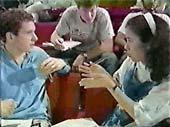Peer Instruction
Introduction to Peer Instruction,
at
Physics and Astronomy New Faculty Workshop (Greenbelt, MD),
Monday, June 28, 2010:
Education: Transferring information or engaging the mind?,
at
HKUST Teaching and Learning Symposium, Hong Kong University of Science and Technology (Hong Kong),
Wednesday, December 12, 2001:
Understanding or Memorization: Are we Teaching the Right Thing?,
at
Physics Colloquium, University of Maryland (College Park, MD),
Monday, November 1, 1993
Memorization or Understanding: Are We Teaching the Right Thing? The Benefits of Peer-to-Peer Teaching,
at
Course on Advanced Teaching Skills: Stimulating Lively and High Yield Learning through the Use of Interactive and Innovative Teaching Techniques, Brigham and Women's Hospital and Harvard Medical School's Postgraduate Medical Education Program (Boston,MA),
Saturday, May 31, 2014:
Flipping the STEM classroom: How to turn your students' worlds upside down,
at
Frontiers of Engineering Education Educational Innovation Seminar Series, Worcester Polytechnic Institute (Worcester, MA),
Wednesday, November 7, 2012
Comprensión o Memorización: ¿Estamos haciendo lo correcto?,
at
Universidad del Sinu (Monteria, Colombia),
Tuesday, November 2, 2010:
Peer Instruction: Methods and Techniques,
at
Physics Colloquium, Ohio University (Athens, OH),
Friday, June 6, 2003:
Understanding or Memorization: Are we Teaching the Right Thing?,
at
Physics Colloquium, Brandeis University (Waltham, MA),
Thursday, December 1, 1994
Confessions of a converted lecturer,
at
SAIT Polytechnic (Calgary, AB, Canada),
Monday, May 11, 2015:
Educating the Innovators of the 21st Century,
at
Ann Ferren Conference, American University (Washington, DC),
Friday, January 11, 2013:
ConcepTest design workshop,
at
KTH Royal Institute of Technology visit, Harvard University (MA),
Friday, February 11, 2011:
Active Learning and Interactive Lectures Part I: Confessions of a converted lecturer,
at
CERTI Faculty Workshop, University of Missouri-Rolla (Rolla, MO),
Friday, October 22, 2004:
Understanding or Memorization: Are we Teaching the Right Thing?,
at
Physics Colloquium, University of Leuven (Leuven, Belgium),
Tuesday, September 1, 1992
From âsage on the stageâ to âguide on the sideâ,
at
Bar-Ilan University (Ramat Gan, Israel),
Thursday, June 25, 2015:
 Peer Instruction actively engages the students in their own learning. Carefully chosen questions (ConcepTests give students the opportunity to discover and correct their misunderstandings of the material, and, in the process, learn the key ideas of physics from one another.
Peer Instruction actively engages the students in their own learning. Carefully chosen questions (ConcepTests give students the opportunity to discover and correct their misunderstandings of the material, and, in the process, learn the key ideas of physics from one another.